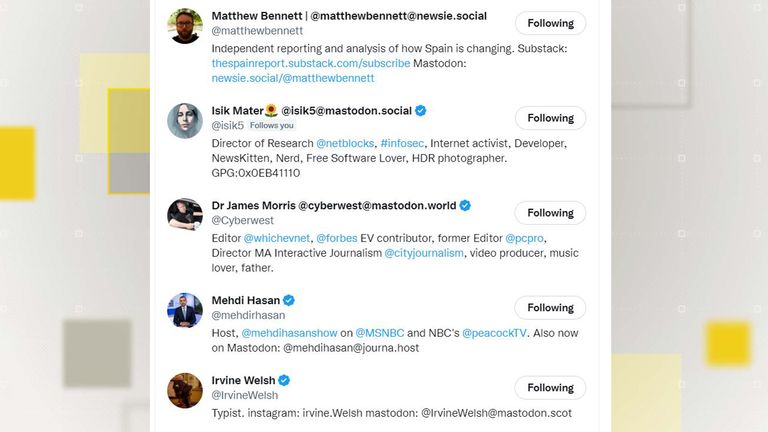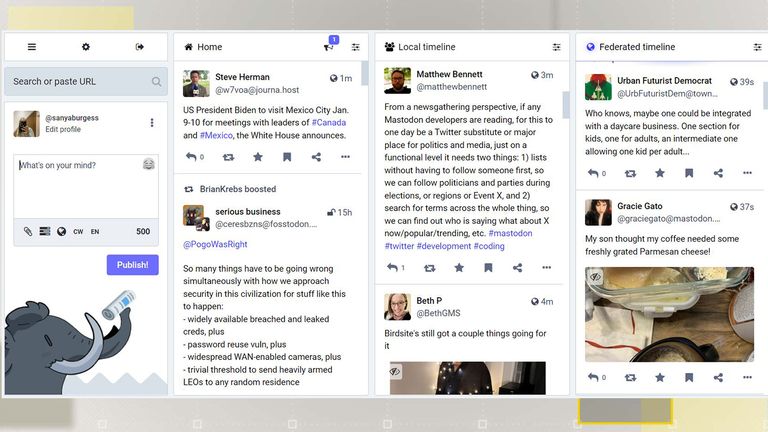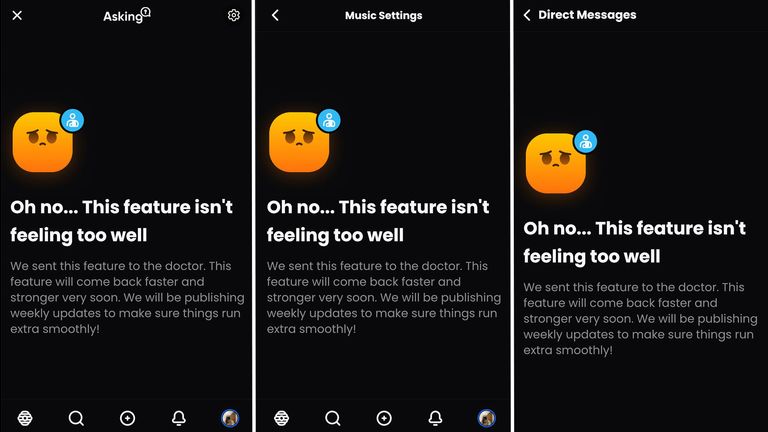For many users, Twitter has felt like a ship about to sink ever since Elon Musk took over.
Unpopular changes such as the accounts of far-right figures being reinstated, banning journalists critical of Musk and sudden mass sackings of staff have left some feeling uncertain about the social media platform’s future – or rather, their own future on the platform.
So Twitter users have been doing what people on a sinking ship do: they’ve been investigating where the lifeboats are and have been putting on life vests.
This has manifested in a surge of people climbing aboard other social media platforms and linking their new accounts to their Twitter profile in the hope of staying afloat with their followers.
People googling “Twitter alternatives” shot up across the world on 28 October, the same day Musk’s takeover was confirmed.
The search was most popular in Germany, followed by Ireland and the UK, according to Google’s data.
A number of rival social media sites have emerged as possible contenders.
Mastodon appears to have generated the most “buzz” thanks to a number of celebrities and influential profiles such as Stephen Fry (with 91k followers on his new account) and Greta Thunberg (77k followers) adopting the new platform.
Another popular alternative is Hive Social, boosted by its Gen Z friendly interface.
None of the alternative platforms being widely considered are new, but both Mastodon and Hive Social were generally not well known before October.
Other contenders for the social media crown include those that have already made a name for themselves by promoting their platforms as homes for free speech.
This includes Truth Social, set up by Donald Trump after he was kicked off Twitter in January 2021, and Parler, a platform that rapper Kanye West attempted to acquire before the deal was publicly abandoned shortly after he made a number of antisemitic comments and said there are “a lot of things I love about Hitler”.
So how worried should Twitter be about these rivals?
A 50-day snapshot of the popularity of these platforms before and after Musk’s takeover shows the reality of this social media race.
Sky News has been given data showing how many times these apps have been downloaded in the UK and across the world by data.ai, a mobile data analytics provider.
Looking at UK downloads of Twitter, Mastodon, Hive Social, Truth Social and Parler, 4 and 17 November were significant moments – with downloads of Mastodon and Hive Social exceeding those of Twitter on a number of occasions.
Between 5 and 12 November, Twitter downloads in the UK began to stumble, while interest in Mastodon rocketed.
The initial blip came after large numbers of Twitter’s staff were abruptly fired at the end of October. The site had also been hit with a deluge of racist and bigoted posts from users praising Musk’s intention to reassess the site’s moderation rules.
It also followed the announcement that users would be able to pay to gain a ‘blue tick’ on their Twitter profile. This symbol was previously reserved for accounts that were in some way trustworthy or notable.
The surge of interest in Mastodon and Hive Social in the middle of November came after the ‘blue tick’ changes were paused after issues arose, Twitter staff were told to commit to a new “hardcore” Twitter or quit, and a number of articles highlighting other apps were published.
Downloads of Truth Social and Parler seemed mostly unaffected by Twitter’s turbulence, other than Truth Social seeing a small surge in downloads on 20 November.
Looking at worldwide downloads, Twitter’s popularity was essentially untouched by the competitors. Mastodon, Hive Social, and to some smaller extent Truth Social, saw a similar pattern of increased popularity as in the UK market but on a much smaller scale.
So has the furore over Musk’s version of Twitter been a storm in a tea cup?
Matt Navarra, a social media consultant and industry analyst, told Sky News: “I don’t think Twitter will collapse… but how popular it will remain and how engaging the platform is for brands, news publishers and creators is another question.”
He believes Twitter will go through a period of not being the “polished product” users expect from a company of this size and popularity, given the policy changes and the large number of staff who were fired or quit.
Another challenge will be whether Musk’s Twitter will continue to be enjoyable and engaging enough for users.
“The changes that Elon Musk is making, like bringing back some of the worst Twitter users ever during this amnesty for banned and suspended accounts is not going to make for a particularly pleasant tweeting environment,” Navarra said.
Sky News has been monitoring Twitter’s two main rivals, tracking how they have coped with the increased demand and how users have responded.
MASTODON
The data shows Mastodon has been Twitter’s most serious competitor.
Users have been putting links or Mastodon handles (usernames) onto their Twitter accounts either because they have already migrated platform or are prepared to.
As more and more users did this, Twitter announced a short-lived policy that banned linking to third-party websites and blocked Mastodon’s Twitter account.
While Twitter’s actions indicate they may have been spooked by the buzz around Mastodon, the data.ai stats show downloads in the novel platform flatlined towards the end of November and in early December.
Many users have commented on Mastodon itself, on other social media, in blogs and news publications, that they find the platform difficult to use.
Despite it looking similar to Twitter, it works differently. It’s decentralised, which means it isn’t owned by a single person or company.
Instead, users pick and join a ‘server’, which essentially functions as a community space. Users can still interact with the entire Mastodon userbase but the servers essentially give users a home network with other like-minded accounts.
This means each server operates with slightly different rules, including how content is moderated.
HIVE SOCIAL
Founded in 2019 by a then 22-year-old, Hive Social is an appealing home for Gen Z users.
Its membership surged to 1.5 million users in November after being featured in Teen Vogue.
The app looks more like Instagram than Twitter and has elements of blogging site Tumblr and even one of the first social media sites, MySpace, from which it borrows the ability to play music on your profile.
Or at least in theory. That feature, along with many others, such as direct messaging and a question and answer tool, are currently down. Loading speeds on the app have improved, but many features still lag.
Concerns over the security of Hive Social brought the entire platform down. The team expected the app to be down for two days but it ended up offline for more than two weeks.
While some users applauded the small team behind the scenes for taking the app down entirely until it could be fixed, it served as a cautionary tale for people considering quitting Twitter.
Navarra explains: “I think with anything online, nowadays, we all have to be cautious in terms of where we’re placing any information about ourselves and publishing content.”
He says Hive Social is a victim of its own success and its viral popularity meant it went from thousands of users to more than a million.
“It’s challenging for a company to scale at that rate… it’s still learning and growing. And it’s having to do it very quickly.”
FREE SPEECH RIVALS
Musk has made commitments to improving what he terms “free speech” on Twitter.
This does not appear to have had much impact on social media platforms that have built their brands around this idea already.
SimilarWeb, a digital intelligence platform, has provided Sky News with data looking at daily visits to three such sites: Truth Social, Parler and also Gab, which is described on its site as championing “free speech, individual liberty and the free flow of information online” but has been repeatedly connected with the far-right and neo-Nazis.
Twitter is far more popular than the three platforms, and although there are some surges in engagement for Truth Social and Parler in November, Musk’s platform remains unmoved.
While Twitter is weathering this initial storm, eyes will continue to watch the platform as we enter the new year.
“Twitter is never going to be the same again,” Navarra commented, “and we’re going to see what Twitter 2.0 looks like in 2023.”



